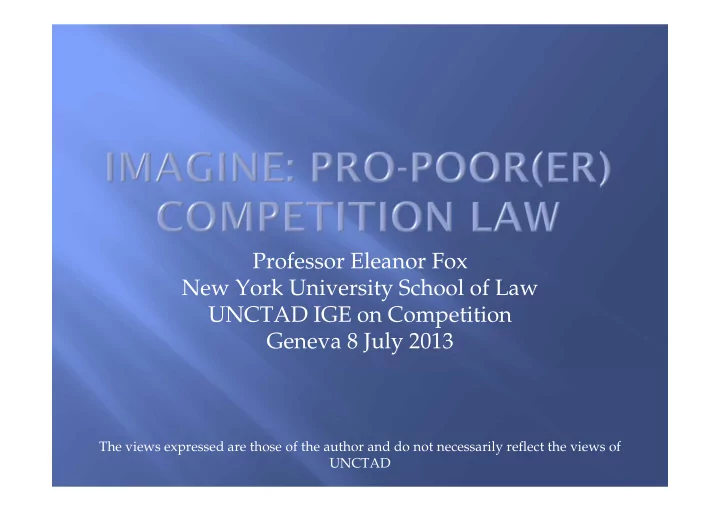

Professor Eleanor Fox New York University School of Law UNCTAD IGE on Competition Geneva 8 July 2013 The views expressed are those of the author and do not necessarily reflect the views of UNCTAD
� I. POVERTY � II. UNLEASHING POTENTIALS � III. THE ROLE OF COMPETITION LAW � SCOPE OF THE LAW: The State, Exemptions � PROCEDURE � SUBSTANTIVE RULES � IV. THE ROLE OF COMPETITION POLICY � NATIONAL � INTERNATIONAL � CONCLUSION: a new consciousness? 2
� A problem of humanity as well as productivity � Children starving � UNICEF: “48% of children in India are stunted” 7 June 2013 � Millennium development goals 2000 � The World Bank � “We have made remarkable progress in reducing the number of people living under $1.25 a day in the developing world, but the fact that there are still 1.2 billion people in extreme poverty is a stain on our collective conscience,” said World Bank Group President Jim Yong Kim . “This figure should serve as a rallying cry to the international community to take the fight against poverty to the next level.” 17 April 2013 � Nearly 45% live on $2.00 a day or less � 80% in African LDCs, 72% Asian LDCs UNCTAD May 2011 3
� The multi-faceted attacks on poverty � and lack of shared prosperity – inequality hurts � Interdependent policies, working together � Food, water, health, schools, energy, transportation, infrastructure, bank loans, economic opportunity � UNCTAD, OECD, WORLD BANK � The Trade-Growth-Poverty Nexus � Exports and jobs –UNCTAD empirical report 2013 � “How are the Poor Affected by International Trade in India” � But many gains have not trickled down to the poor � “Competition” comes late to the scene 4
� The competition leaders and their allies in World Bank, USAID etc. � Look for where they can help the most � Pre-ICN Forum in Warsaw � “Making Markets Work for Development: a reform agenda on competition” � Slides/materials available at � https://www.wbginvestmentclimate.org/advisory-services/cross-cutting- issues/competition-policy/pre-icn-forum-making-markets-work-for- development.cfm � Moving and practical examples: “Unlocking agribusiness value chains” 5
� “Africa can help feed Africa” � Removing barriers to regional competition in food � Regional trade is crucial but it is easier to trade with rest of the world than with other African countries � Slides by Paul Breton � Key Agribusiness in Kenya, Francis W. Kariuki � Pyrethrum sector – getting rid of monopsony/monopoly power of Pyrethrum Board � Empowering 40,000 small farmers � USAID by Nicholas Klissas Zambia – maize market controls � � Farmers force to buy overpriced fertilizer sourced through exclusionary procurement Papua New Guinea – narrowly escaped rice import, production and � trading monopoly that would have increased prices 100% 6
� A. Scope of the law � 1. How far does the law reach state acts? � Note that almost all of the World Bank examples involved the state � Project with Deborah Healey; 6 suggested principles: � SOEs � State officials � Narrowing state and local action defenses � Narrowing lobbying defenses � Empowering competition authority to challenge or trigger � Dis-applying or preempting rogue state measures � 2. Exemptions and non coverage � Agriculture, banking, regulation, IP, off shore acts � Procedure: a private right 7
� Principles and perspectives more rather than less friendly to the poorer, outsiders � consistent with efficient, dynamic markets � 1 discounting � 2 market definition choices � 3 leveraging, foreclosure and access � 4 efficient foreclosures � 5 excessive pricing � 6 buyer power � 7 intellectual property � 8 in general, simpler rules 8
� Insight from Mexico – broadly applies � In spite of liberalization, still suffering from legacy of state-led, corporatist economic policy � which lingers in vast pockets of anticompetitive regulation � Markets still have shallow roots � and competition is struggling to hold its own against state intervention and rent seeking. Angel Lopez Hoher Restraints by and within the nation � � Targeting regulation, monopoly boards, trade restraints Restraints in the global economy � � Export cartels, aid in discovery, cooperation 9
Competition is a vital pro-poor, pro-poorer policy � � There is a pro-poorer perspective on competition law � There is a pro-poorer perspective on competition policy � Of course it is no magic bullet to reduce poverty � but at least we can: � create consciousness of the pro-poorer/outsider perspective � support nations with large poorer populations as they do what they can, using competition law/policy, to make their people better off 10
Recommend
More recommend